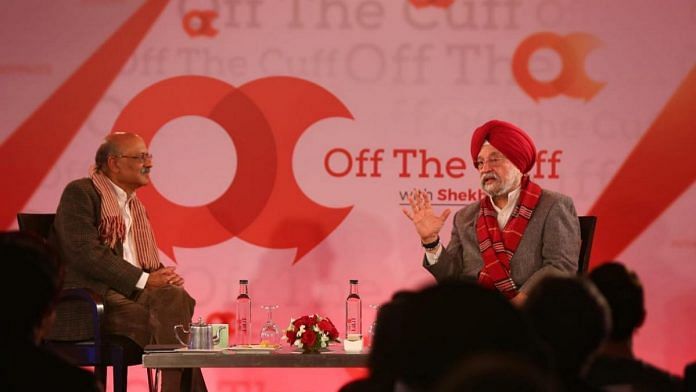New Delhi: The Narendra Modi government will look into the cases of Ahmadiyyas and Shia Muslims facing persecution in Pakistan, Bangladesh or Afghanistan if they seek shelter in India, Union minister Hardeep Singh Puri said Tuesday.
“If persecuted Ahmadiyas or Shias seek refuge in India, we will vet the cases separately,” Puri said at ThePrint’s ‘Off the Cuff’ in New Delhi. The Union civil aviation and urban development minister was in conversation with ThePrint’s Editor-in-Chief Shekhar Gupta.
Referring to the violent protests in Assam, Delhi and other parts of the country against the Citizenship (Amendment) Act, Puri said those who have perpetrated violence and misled the people will be identified.
The minister said he has been a great admirer and champion of youth mobilisation, but things have come to a point where one seriously needs to “introspect” and see what has happened.
“Look, let me share one thing with you. This city is full of CCTV cameras, every one of us has a phone, everything has been captured and when you look at that evidence, you will have the faces, you will get the names of the people who have done it. And I think, the picture, which is going to emerge from this, will cause a lot of discomfort to a lot of people,” he added.
The new citizenship law seeks to grant citizenship to non-Muslim refugees from Pakistan, Bangladesh and Afghanistan if they faced religious persecution there, and arrived in India before 31 December 2014.
The Union minister said dissent is important in a healthy democracy but he thought there is a desire to take the narrative in a particular direction.
Puri said the Narendra Modi government was willing to have discussions. “Democracy is based on difference in opinions, respecting diversity and respecting dissent but at what point it metamorphosed into people beating up people and burning vehicles,” he asked.
‘Dealing with the problem of minorities’
Explaining the rationale behind excluding Muslims from the Citizenship Act, Puri said the law deals with three theocratic states having a particular religion.
“That is Islamic religion. If you are a persecuted minority in Pakistan…the persecuted minorities were 20 per cent and are down to 2 per cent. Where have they gone? They have gone and sought shelter elsewhere,” Puri argued.
When asked whether the government puts Bangladesh in the same ‘theocratic’ category as others, Puri said “no”. His response is significant in the backdrop of Bangladesh home and foreign ministers postponing their visits to India over protests against the new law.
“When we had a problem with Sri Lanka, and Tamils sought refuge, hundreds and thousands of them came and stayed. At that time, we were dealing with Sri Lankan problem. Today, you are not dealing with a Pakistani or Bangladeshi problem, you are dealing with a residual problem of history, a problem of minorities,” he explained.
To a question from the audience that Muslims, too, are persecuted in Pakistan and should have been part of the Act, Puri said, “I don’t agree that Muslims are not persecuted in Pakistan. I am the first to agree with you, look at Ahmadiyyas, Shias — have we ever said that we will not take them if they are persecuted?”
But he clarified that the entire Muslim population, which is the majority population in those three countries, cannot be included.
The minister also sought to allay fears that the Act will serve as an “open invitation” for the minorities in the three countries to shift to India.
“No one is suggesting that Bangladesh is persecuting minorities today. You have a government, which is fully in charge. But the fact of the matter is that over the last several decades, many such people had to (face persecution)…this is intended to correct a historical aberration and believe me it will never be more than that,” he said.
Need to account for Indian citizens: Puri on NRC
Puri said the Citizenship Act and the National Register of Citizens (NRC) are separate and serve a different purpose with a different context. He said there is a need to account for Indians and, hence, the need for the NRC.
“We must also send a signal that we must account for Indians. You must know who is there. Let us at least have a register to find out if you’re an Indian citizen by right. If you’re applying for Indian citizen(ship), it doesn’t mean that you will be sent back to the place from where you fled persecution,” the minister added.
Puri asserted that no Indian citizen would be affected by the Citizenship Act.
“What this (Act) gives is like those people in unauthorised colonies, who have got malikana haq (ownership rights), you are trying to acknowledge their existence.”
He added, “No Indian citizen, and I repeat this with great emphasis, will have anything, which is their entitlement, taken away or their citizenship be questioned.”
The Union minister also said both Prime Minister Narendra Modi and Home Minister Amit Shah have already given out statements on how they will deal with issues related to NRC and the Citizenship Act.
“I have seen a number of statements by the PM and the home minister that we will deal with the issue. And if we have gaps that are being exacerbated through fear-mongering, let’s first set that aside, sit down and talk.”
He also said many are stretching the issue. “…when you go through the process of identification and registry-building, some…aberrations will come, but the state and Centre will work together,” he said.

Also read: No heritage building will be pulled down for Delhi’s Central Vista makeover: Hardeep Puri




Given the mood and temper of the times, not one will apply for sanctuary in India.